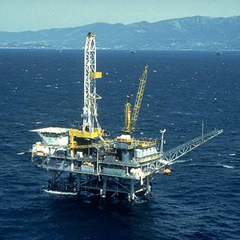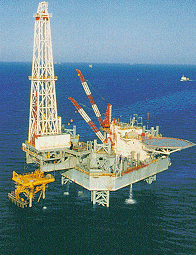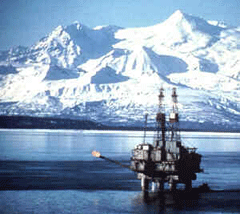Drilling Beneath the Seas
Air Date: Week of November 17, 2006

Offshore drilling supplies about 25 percent of the nation’s natural gas production. (Courtesy of Department of the Interior)
The Republican-controlled Congress has a few more weeks before they hand over control to Democrats. One item high on the agenda is a proposal to expand offshore oil drilling. Living on Earth's Jeff Young reports from Capitol Hill.
Transcript
GELLERMAN: From the Jennifer and Ted Stanley Studios in Somerville, Massachusetts - this is Living on Earth. I’m Bruce Gellerman. Time’s running out for Congressional Republicans. But before they give up the reins of power in Congress, the lame duck lawmakers want to pass a controversial piece of legislation. It would open up offshore drilling to oil and gas companies. And as Living on Earth’s Jeff Young tells us, support for the proposal is coming from an unsual source—some environmental groups.
YOUNG: For 25 years most of the outer continental shelf has been off limits for offshore drilling. Federal moratoria ban new oil and gas exploration from nearly all US coasts, except in the western Gulf of Mexico. New Mexico Republican Pete Domenici, who heads the Senate’s energy committee, says it’s time for that to end.
DOMENICI: And the American people should know that the outer continental shelf, which belongs to them, contains invaluable resources for their future to go and drill for.
YOUNG: Both the House and senate passed bills to expand offshore drilling. The expansive House bill would have ended all federal moratoria on drilling in favor of letting states decide. That measure appears to be dead. But Domenici and other drilling supporters hope something close to the Senate’s version might still pass in the final weeks of the 109th Congress. That bill would give oil and gas companies access to about 8 million acres deep in the central Gulf of Mexico.

Offshore drilling supplies about 25 percent of the nation’s natural gas production.(Courtesy of Department of the Interior)
YOUNG: Domenici says the area is rich in natural gas and could yield more than a billion barrels of oil. His supporters say drilling technology has come a long way since oil spills in the late 60’s turned the tide of public opinion against offshore drilling. But environmentalists argue that even though oil platforms are safer, pipelines and tankers are still risky. Mike Gravitz of the US Public Interest Research Group says ending the moratorium in this spot could lead to more drills, and the risk of more spills, elsewhere.
GRAVITZ: I think that would set a bad precedent. And after all the solution to our energy problems, whether you want to call it energy security or independence, really does not lie at the end of a drill bit. It really lies in our own behavior and the kind of investments we make in this country over the next 20 years.

Forty-three wells exist off of the coast of California alone. (Courtesy of Department of Energy)
DAVIS: Coastal Louisiana is essentially disintegrating in large part because of the way it’s been managed over the past several generations unless we actually re-plumb the Mississippi River and the coastal landscape it will continue to disappear.
YOUNG: That will take money—lots of it. And offshore drilling bills would pump lots of money into Louisiana. Drilling supporters included something called revenue sharing. About a third of the money raised by lease sales and royalties would not go to the federal treasury but instead to the states that have drilling off their coasts. Louisiana has pledged to use that money to patch up its battered coast. Davis notes the irony here. It was the oil and gas industry that caused much of the damage with canals and pipelines that cut up the marsh. Now he hopes drilling revenue could help fix things.
DAVIS: If these dollars are gonna be generated, shouldn’t some of them go to dealing with the environmental costs that were incurred to create those dollars and produce that energy.
YOUNG: The idea of diverting federal dollars to the states is controversial on Capitol Hill. Some worry that other states will demand a piece of the pie, draining one of the biggest sources of federal revenue. But revenue sharing took on a new sense of urgency in the wake of hurricane Katrina.
[SOUND UNDER WOMEN’S VOICES, MILLING ABOUT]

Offshore drilling rigs can stand and operate in water that is up to two miles deep.(Courtesy of Department of the Interior)
MILLING: We urge you to protect and restore America’s wetlands through the creation of a continuous funding stream now, before it’s too late. Thank you.
[APPLAUSE]
YOUNG: It’s a ticklish spot for national environmental groups. Mike Gravitz of the
Public Interest Research Group wants to help the Gulf coast rebuild but he does not want more oil rigs in gulf waters.
GRAVITZ: I can really understand why environmental groups in the gulf are really hungry for this kind of revenue to begin doing additional work on wetlands restoration. And all I would say is there are lots of other sources, alternative sources of financing, for that restoration.
YOUNG: Gravitz hopes that argument holds through mid-December, when the Republican-controlled lame duck Congress will end. Once Democrats take control, the chances for more offshore drilling will probably dry up.
For Living on Earth, I’m Jeff Young in Washington.
Links
Naturalgas.org on Offshore Drilling
The group America's Wetland supports a drilling bill with revenue sharing to
Living on Earth wants to hear from you!
Living on Earth
62 Calef Highway, Suite 212
Lee, NH 03861
Telephone: 617-287-4121
E-mail: comments@loe.org
Newsletter [Click here]
Donate to Living on Earth!
Living on Earth is an independent media program and relies entirely on contributions from listeners and institutions supporting public service. Please donate now to preserve an independent environmental voice.
NewsletterLiving on Earth offers a weekly delivery of the show's rundown to your mailbox. Sign up for our newsletter today!
 Sailors For The Sea: Be the change you want to sea.
Sailors For The Sea: Be the change you want to sea.
 The Grantham Foundation for the Protection of the Environment: Committed to protecting and improving the health of the global environment.
The Grantham Foundation for the Protection of the Environment: Committed to protecting and improving the health of the global environment.
 Contribute to Living on Earth and receive, as our gift to you, an archival print of one of Mark Seth Lender's extraordinary wildlife photographs. Follow the link to see Mark's current collection of photographs.
Contribute to Living on Earth and receive, as our gift to you, an archival print of one of Mark Seth Lender's extraordinary wildlife photographs. Follow the link to see Mark's current collection of photographs.
 Buy a signed copy of Mark Seth Lender's book Smeagull the Seagull & support Living on Earth
Buy a signed copy of Mark Seth Lender's book Smeagull the Seagull & support Living on Earth

